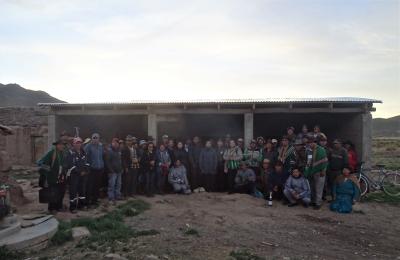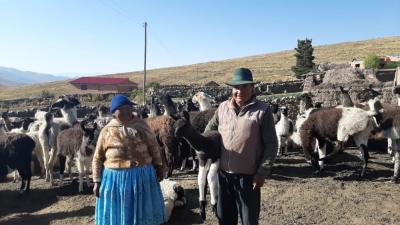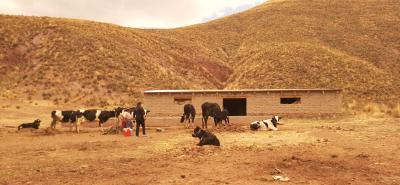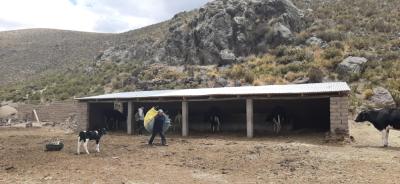An unthinkable technology to resist Covid-19

The 55 fodder sheds built last year allowed the Indigenous Peoples of Jach'a Marka Tapacarí Cóndor Apacheta to feed cows and llamas without the need to move from the territory.
Being protected from the rain and wind, the alfalfa lasted longer, and people could avoid going to the city where the virus was circulating and the production of milk and cheese could be maintained. In this way, food security was guaranteed during the pandemic and the production of its main sources of income was maintained.
By Betty Villca Mitma and Damián Andrada
The Bolivian plateau exceeds 4000 meters above sea level. There, the landscape is arid and cold, and agricultural and livestock activities are a challenge for those who live in this hostile climate. For this reason, at the end of 2019, the indigenous peoples of the Jach'a Marka Tapacarí Cóndor Apacheta Indigenous Territory, in the department of Oruro, built 55 storage sheds for cattle fodder through the Indigenous Navigator project.
What at first had emerged as a project to optimise the breeding of cows and llamas ended up being a technology that made it possible to cope with the COVID-19 pandemic that strongly affected the Plurinational State of Bolivia between the months of June and August. In this way, cattle breeders and milk and cheese producers were able to keep the animals well fed without the need to move from their territory.
Consequently, during isolation, the sheds played a prominent role in meeting two of the United Nations development goals and objectives: community food security through the generation of their own food; and decent work, through the incorporation of technology and improvement in working conditions for the production of cheeses, which are then sold in the city. A significant goal in a context of economic crisis and global recession.

The testimony of the beneficiaries
Victoria Martínez de Arroyo is a community member of Challwamayu, in the Ayllu Cóndor Apacheta. Her family was one of the beneficiaries of the development project and explains that the storage sheds have helped during the pandemic: "We store barley for the llamas and then we give them to eat. The llamas were just nearby. And it was not necessary to take them to the hill. The storage shed has served me very much”
Like other Latin American countries, the SARS-Cov-2 pandemic had a strong impact on Bolivia. At the beginning of the pandemic, the lack of investment in the health system caused hospitals to collapse. In this way, the Indigenous Peoples of the Bolivian Altiplano had to choose between preventive isolation and the need to work to obtain resources to survive.
Her neighbor and former community leader Challwamayu, Valentín Arroyo, denounces the helplessness on the part of the authorities, the broken promises, the absence of medical attention and the lack of evidence of COVID-19. Faced with the crisis in the health system and as a camelid breeder, the community member highlights the construction of fodder sheds: “At this time of the pandemic, they have been very necessary because we have not left our community. We have had to stay here, feeding the animals with the little food we had. Food security also means to protect cattle fodder from dust storms and inclement weather. In the sheds, the fodder is protected from the rain that makes it wet and makes it rotten. When it’s under the roof, it’s protected". From the Negro Kayma community, Valerio Mamani adds that the shed also served to protect the cows and calves from the cold. Once the low temperatures had passed, he returned to store alfalfa.
The community members agree that the sheds allowed them not to have to go out to find food for the cows and llamas. In this way, they were able to stay in the community, while the forage was protected and lasted longer. Its impact on the Jach'a Marka Tapacarí Cóndor Apacheta Indigenous Territory is even greater because the Indigenous Peoples of this region obtain part of their resources from the production of Creole cheese that they sell in the towns. Facing COVID-19, the community members also organised themselves so only two people ventured out of the community to sell cheeses, reducing the likelihood that someone could enter the virus to their community, which is located in a rural area and therefore was less exposed than the city.

Protecting the forage to produce more milk
The comments in favor of the sheds are also repeated in the Ayllu Tapacarí. In the Torre Jak'e community, Vitalia Martínez highlights: “Before, the forage was out in the open, all day in the sun. Now we are keeping the food inside the shed and it stays green and does not lose its color. Alfalfa no longer rots and is protected from rain and heat. The sheds have really served us a lot”.
As the men are especially dedicated to working the land and preparing the soil, Vitalia adds that the sheds especially benefit women: “We have been the most benefited because we are responsible for caring for and milking the cattle. The better fed the cows are, the more milk they produce. And with the sheds we improve milk production. And more milk, more cheese”.
In the Vilacollo community, the beneficiary Berna Quispe Condori also agrees that the sheds are a very valuable help for the women: “The shed has served us a lot to protect the fodder from the rain and the sun. I put all the cattle feed there. At the time we are also cutting thatch and we are going to fill the shed. These constructions have helped us women the most, who are responsible for keeping everything clean and feeding the cows and llamas”.
In some cases, the beneficiaries already had a shed, but it was small and had little storage capacity. This is the case of Melecio Martínez, from the Marcavi community, who highlights the possibility of storing a greater amount of forage: “I had a small shed before and this one that we have built is bigger and has saved me a lot during this pandemic. The shed has helped us to quickly store and give food to cattle. In rainy weather, more than anything, it has helped me”.
The Indigenous Navigator project is a global tool for the realization of the rights of indigenous peoples. It is funded by the European Union and in Bolivia it is coordinated by the Center for Legal Studies and Social Research (CEJIS). The selection of the projects and their implementation were carried out by the Indigenous Peoples of Jach'a Marka Tapacarí Cóndor Apacheta who were inclined to recover their language and build these fodder sheds.
Although they were not specifically designed to deal with COVID-19, the fodder sheds were an extremely useful tool to traverse preventive isolation to avoid contracting the coronavirus. Not only did it allow the storage of alfalfa to be optimised, but it also allowed them to remain in the territory and increase milk production. In this way, the Indigenous Navigator demonstrates the benefits of the Indigenous Peoples themselves participating in the decision-making and choice of their own development projects.


El Centro de Estudios Jurídicos e Investigación Social (CEJIS)

Contact
